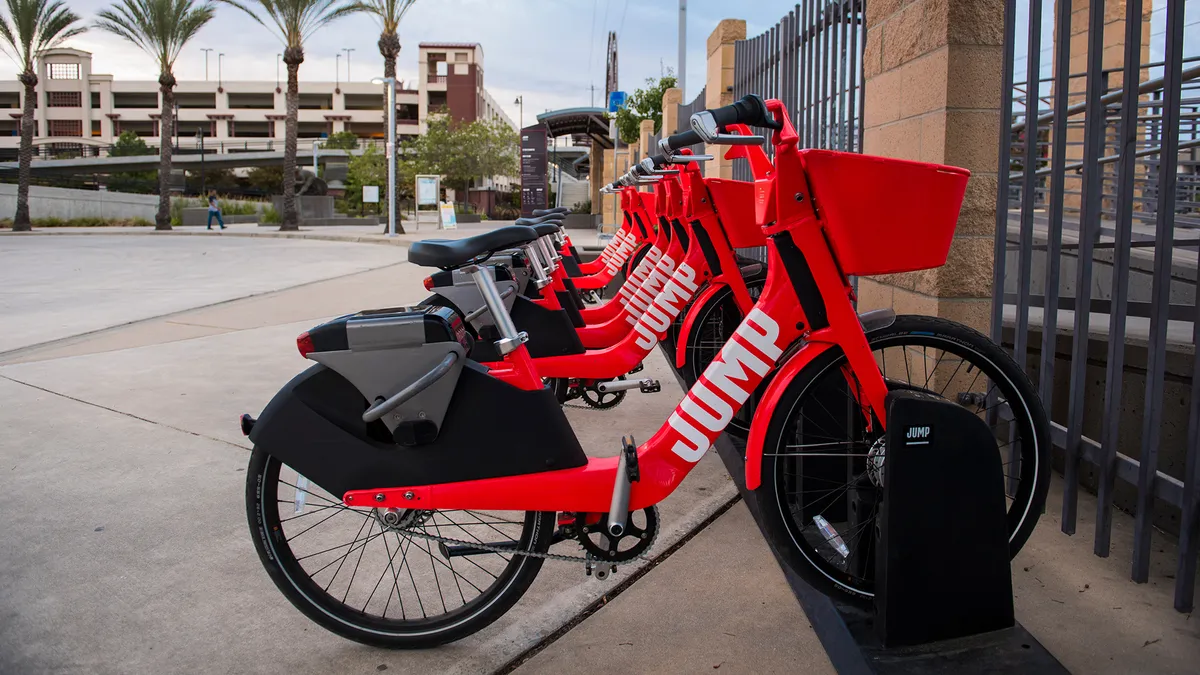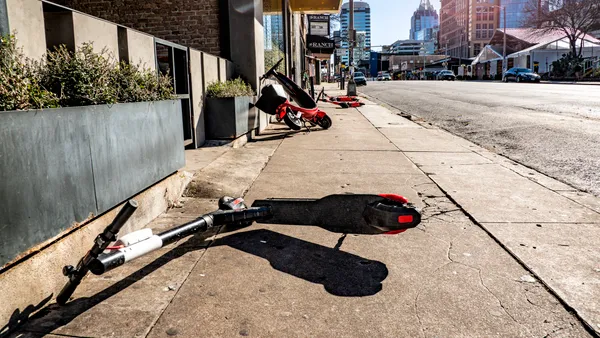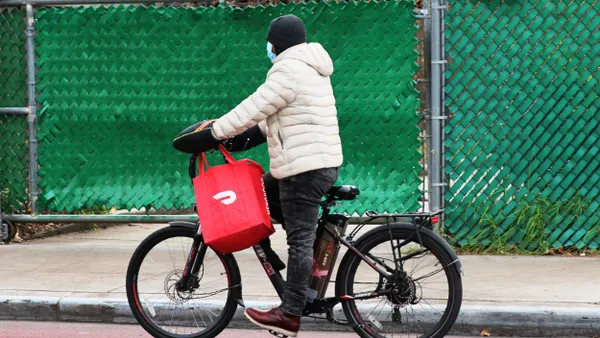UPDATE, June 1, 2020: Brian Dewey, CEO of bike-sharing platform Koloni, wrote an open letter to Uber CEO Dara Khosrowshahi with an offer to purchase JUMP bikes that are currently being sent to scrap yards.
Dewey offered to pay 250% over the scrap price Uber is receiving for the bikes in exchange for a connection with Uber or Lime engineers to help unlock the bikes and move them to Koloni's servers. Dewey also requested Khosrowshahi send the names and contact information of Uber engineers who worked on JUMP and are currently unemployed.
"This micromobility industry has a collective mission to reduce carbon emissions across the globe. These recent events are shown to be hypocritical and counterproductive to the collective mission," the letter reads. "I am happy to talk further if bikes are still available."
In 2018, Koloni worked with micromobility company Spin to redeploy its old bikes when it shifted to solely scooter-sharing operations.
Dive Brief:
- A video showing hundreds of old JUMP e-bikes being crushed for scrap at a Durham, NC recycling facility has created buzz this week, resulting in a number of disappointed bike advocates and micromobility leaders.
- Twitter user Cris Moffitt shared the video in a Twitter thread on May 26, calling the bike recycling "#SenselessWaste" and questioning a lack of bicycle reuse, especially amid a national bike shortage. The thread prompted dozens of responses and calls for Uber and Lime — the former and current operators of JUMP, respectively — to consider donating the bikes instead.
More keep rolling in and getting trashed.????????️ Probably THIRTY semi loads???????????? or more so far ... #SenselessWaste #BikesForKids ???????? @UberJump pic.twitter.com/ee3NmCP7If
— Cris Moffitt (@CrisMoffitt) May 27, 2020
- In a statement, Uber said it explored options for donation, but significant issues "including maintenance, liability, safety concerns, and a lack of consumer-grade charging equipment," resulted in the company's decision to "responsibly recycle them." Lime said in a statement that it "took possession of tens of thousands of e-bikes" under its recent deal with Uber, but it has not recycled any of the e-bikes in its fleet. "Once the transaction officially closes, we plan to work with Uber to find sustainable ways to donate and re-use any remaining ebikes in their inventory," the statement reads.
Dive Insight:
Cities have seen a cycling surge amid the COVID-19 pandemic, as some Americans have scrambled for transportation options to avoid the social interactions that may occur on public transit or in ride-hailing. In March, the nationwide sale of bicycles and repair services almost doubled compared to the same period in 2019, research firm NDP Group found, while the sale of commuter and fitness bikes increased 66% in that month. The New York Times said such interest in bikes has resulted in today's "severe bicycle shortage."
Some bike manufacturers and bike-share operators have put special programs in place to match bikes with riders in need, especially essential workers, but even those programs appear overwhelmed with demand.
It's in respect to this demand that many respondents of Moffitt's tweet are expressing disappointment in Uber's decision to recycle so many e-bikes. San Francisco Bicycle Coalition board member Stephen Braitsch called the decision an "absolute disgrace," while Bike Durham — representing the location at which these bikes were being recycled — reached out to the recycling center in an attempt to salvage some of the bikes.
Foss Recycling, the recycler in question in the video, reportedly declined responsibility for the decision.
Response from Foss recycling was “We have no choice but to scrap them. Contact Uber.” We’re working to find the right contact.
— Bike Durham (@BikeDurham) May 28, 2020
"There are many people interested in helping or maybe even buying these bikes," Spin spokeswoman Maria Buczkowski told Smart Cities Dive in an email. "It is a shame to not see them be put to good use in a time when micromobility could help more essential workers get around."
She reflected on Spin's decision to retire a majority of its pedal bike-share fleet in 2018. Spin donated 20% of its retired fleet to World Vision and Wisconsin Nicaragua Partners, while 76% of the fleet was sold to bike-sharing platform Koloni or other markets for repurposing.
"Our last resort was recycling these bikes. If there were mechanical failures that weren’t fixable, that is only time we considered recycling," Buczkowski said, noting only 4% of Spin's bike fleet was recycled.
While the JUMP e-bikes in question look to be in decent shape, it's the responsibility of the operator to keep riders safe, which Uber said was the factor behind its decision to recycle the bikes. The extent at which that recycling is done safely — particularly in ensuring all batteries are removed prior to the recycling process — is in the hands of the recycler, or in this case, Foss Recycling.
"This is a new item coming into scrapyards," Mark Carpenter, vice president of communications at the Institute of Scrap Recycling Industries (ISRI) told Smart Cities Dive in an interview last year on e-scooter recycling. "ISRI is working to educate its members about [battery-powered devices], and advises them to be on the lookout for these devices."
ISRI declined Smart Cities Dive's requests for comment on this week's JUMP video, as did the National Waste and Recycling Association (NWRA).
This piece has been updated to include comment from micromobility company Spin.












